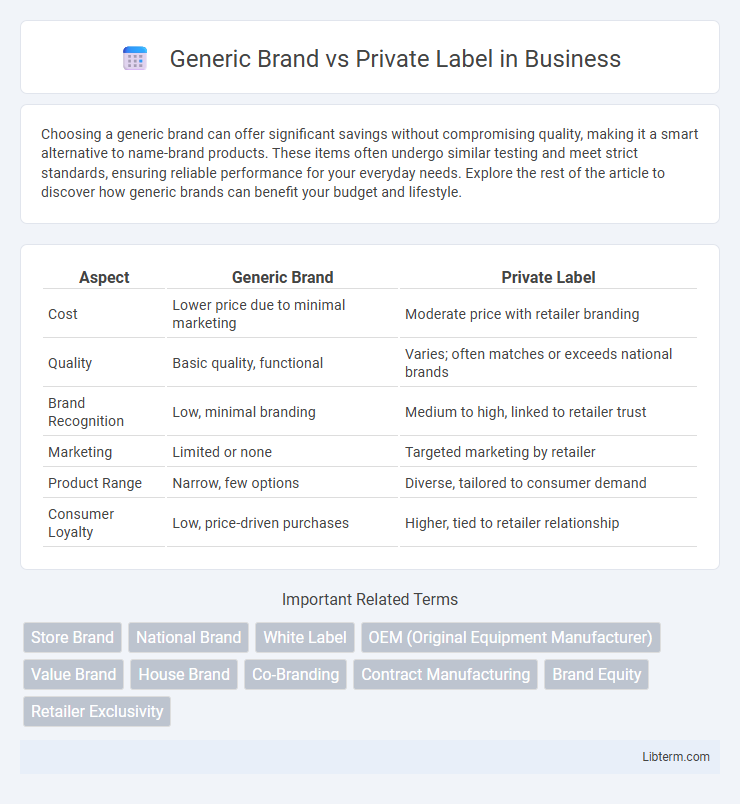Choosing a generic brand can offer significant savings without compromising quality, making it a smart alternative to name-brand products. These items often undergo similar testing and meet strict standards, ensuring reliable performance for your everyday needs. Explore the rest of the article to discover how generic brands can benefit your budget and lifestyle.
Table of Comparison
| Aspect | Generic Brand | Private Label |
|---|---|---|
| Cost | Lower price due to minimal marketing | Moderate price with retailer branding |
| Quality | Basic quality, functional | Varies; often matches or exceeds national brands |
| Brand Recognition | Low, minimal branding | Medium to high, linked to retailer trust |
| Marketing | Limited or none | Targeted marketing by retailer |
| Product Range | Narrow, few options | Diverse, tailored to consumer demand |
| Consumer Loyalty | Low, price-driven purchases | Higher, tied to retailer relationship |
Understanding Generic Brands: Definition and Overview
Generic brands are products marketed without a recognizable brand name, often sold at lower prices compared to national or private label brands. These items emphasize basic packaging and minimal marketing costs, targeting cost-conscious consumers seeking essential quality without brand premiums. Understanding generic brands involves recognizing their role in offering affordable alternatives that maintain functional product standards.
What Are Private Label Products?
Private label products are goods manufactured by one company but sold under another company's brand name, allowing retailers to offer exclusive items that distinguish their product lineup. These products often provide cost advantages by eliminating intermediary branding costs, resulting in competitive pricing for consumers. Retailers control the branding, packaging, and marketing strategies, enabling customization to target specific market segments effectively.
Key Differences Between Generic Brands and Private Labels
Generic brands typically offer basic products without brand identification, focusing on cost-effectiveness and minimal packaging, while private labels are products manufactured by third parties but sold under a retailer's own brand name, often featuring branded packaging and marketing. Generic brands usually compete primarily on price, lacking unique features or branding elements, whereas private labels can provide differentiated quality, design, and brand loyalty similar to national brands. Retailers use private labels to enhance margins and customer retention, distinguishing them from generic brands that target budget-conscious consumers seeking essential goods.
Pricing Strategies: Generic vs Private Label
Pricing strategies for generic brands typically emphasize the lowest possible cost to attract price-sensitive consumers, often resulting in significantly lower prices compared to branded products. Private label pricing balances affordability with perceived quality, positioning these products slightly higher than generics while still undercutting national brands. Retailers leverage private label pricing to boost margins and customer loyalty by promoting value and quality, whereas generics focus on maximum price competitiveness to drive volume sales.
Quality Comparison: Generic Brand vs Private Label
Private label products often deliver comparable or superior quality to generic brands due to strict retailer standards and targeted consumer feedback. Retailers invest in quality control and ingredient sourcing for private labels, enhancing product consistency and reliability. Generic brands typically focus on cost efficiency, which can result in lower quality or less premium ingredients compared to private label offerings.
Consumer Perceptions and Trust
Consumer perceptions of generic brands often center on affordability and basic quality, appealing to budget-conscious shoppers seeking functional products without premium features. Private label brands typically foster higher trust through perceived exclusivity and retailer endorsement, creating an association with consistent quality and value. Trust in private labels is reinforced by targeted marketing and improved packaging, which elevate consumer confidence compared to generic alternatives.
Retailer Strategies for Promoting Each
Retailers employ distinct strategies to promote generic brands by emphasizing affordability and essential quality to attract cost-conscious consumers, often positioning them alongside national brands to highlight value. Private label promotion focuses on building exclusive brand identity through targeted marketing, product differentiation, and loyalty programs that enhance perceived quality and exclusivity. Strategic shelf placement, competitive pricing, and tailored advertising are key tactics used to maximize the appeal and sales performance of both generic and private label products.
Market Trends and Growth Analysis
Private label products are experiencing significant market growth, driven by increasing consumer preference for cost-effective alternatives to generic brands. Retailers are expanding their private label portfolios to capture higher profit margins and build brand loyalty amid competitive pricing pressures. Market trends indicate a rise in premium private label offerings, targeting quality-conscious shoppers seeking value beyond traditional generic brands.
Pros and Cons: Generic Brand vs Private Label
Generic brands offer affordability and broad accessibility by providing no-frills products that meet basic consumer needs, but they may lack distinctive quality and brand loyalty compared to private labels. Private label brands, owned by retailers, often deliver higher profit margins and tailored products with enhanced quality control, yet they face challenges in consumer recognition and require significant marketing efforts. The decision between generic and private label hinges on balancing cost-efficiency, brand differentiation, and consumer trust within specific market segments.
Future Outlook in the Retail Industry
The future outlook for generic brands versus private label products in the retail industry highlights increasing consumer acceptance driven by quality improvements and cost-effectiveness. Private label products are projected to capture a larger market share due to retailers' strategic investments in branding and innovation, enhancing customer loyalty and exclusive offerings. Advances in data analytics and supply chain optimization further empower retailers to tailor private label assortments, strengthening competitive positioning against generic brands.
Generic Brand Infographic

 libterm.com
libterm.com